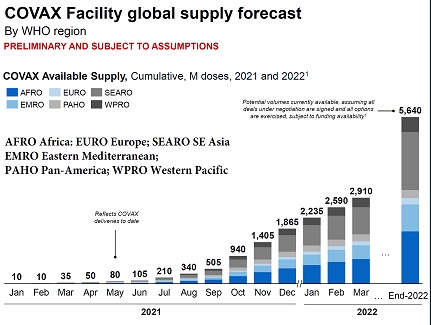
Governments have failed to properly protect their populations from the pandemic. Some have actively encouraged it, the rest have simply been incompetent. Today, their failure to vaccinate the world means poorer countries are now acting as a petri-dish – enabling more mutant variants to emerge.
I first warned here of the pandemic threat on February 9 2020, and then devoted the next 5 posts to it, until finally most governments woke up. Unfortunately, however, very little has changed in terms of their overall competence – most continue to focus on short-term tactical issues. None have thought about the long-term strategies that are essential for normal life to return:
As the chart from Our World in Data shows:
- The worst players are still in denial about the severity of the problem – Brazil’s excess mortality, for example, is 50% above pre-pandemic levels
- N America, Europe and China have begun to vaccinate their populations, but only 40% have yet had at least one jab
- The World average is just 24%; Latin America is at 30%, and Asia ex-China below it
- Africa is down at just 3%, and showing few signs of being able to improve without external support
The good news is that after a very poor start, most adults in N America, Europe and China will have been fully vaccinated against current Covid variants by year-end.
The bad news is that governments in the developed Asian countries are a long way behind with vaccination, as Financial Times data confirms:
- Only 24% of Japan’s population have received 1 vaccination, only 13% are fully vaccinated
- And yet Japan is due to host the Olympics later this month
- Only 24% of Australia’s population and 15% of New Zealand’s have had one jab
- Only 1.75m Australians are fully vaccinated and only 450k New Zealanders
These failures highlight the risk that the chances of new and more virulent variants developing is very high.
Lockdowns only postpone this problem, they don’t solve it. 12m Australians, for example, are now in lockdown due to 200 cases emerging. Southern China has taken equally extreme measures in recent weeks.

The real risk, of course, is that more powerful variants will soon be circulating. These have already developed in India and Brazil. More are probably already in development due to the lack of vaccination.
The reason is simple. Poor people generally live in poor and over-crowded conditions – ideal breeding grounds for new variants to develop. The COVAX programme is supposed to tackle this issue, but as the chart shows it is moving far too slowly:
- As of end-May, only 80m doses had actually been delivered to poorer nations
- Only 105m doses were due to have been made available by the end of June
- Only 1.9bn are currently planned to be available by year-end
These failures are causing more and more chaos in global supply chains.
80% of global trade is carried out by cargo shipping. This depends on the availability of 2m merchant sailors – mostly from poorer countries, because they are cheap to hire. The pandemic meant most have been at sea beyond legal limits due to docking and disembarking restrictions.
Even those who signed up for just 3-4 months have found themselves at sea for up to 18 months. The impact on their mental and physical health is likely to be profound.
And, of course, this ongoing chaos in supply chains is continuing to damage the global economy.
Sooner or later, governments are going to wake up to the fact that the virus is likely now to be with us forever. There is nothing they can now do on an individual basis that will eliminate it. Instead, they should be working together to mitigate the risks, and reopen the global economy.
